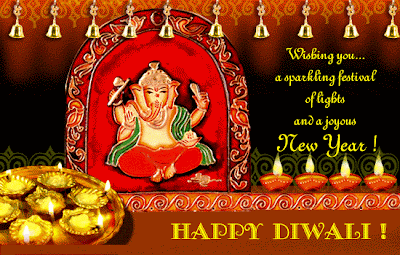For the Community of Taman Putra Prima Phase 2A. A place where the residents Kawasan Rukun Tetangga Tmn Putra Prima Fasa 2A committee members interact. Let us work together as ONE community TOWARDS A UNITED & HARMONIOUS COMMUNITY
Thursday, 8 November 2012
Diwali ~ Festive of lights
Diwali (also spelled Devali in certain regions) or Deepavali,popularly known as the "festival of lights," is a five day festival which starts on Dhanteras, celebrated on thirteenth lunar day of Krishna paksha (dark fortnight) of the Hindu calendar month Ashwin and ends on Bhaubeej, celebrated on second lunar day of Shukla paksha (bright fortnight) of the Hindu calendar month Kartik.In gregorian calendar, Diwali festival is celebrated between mid-October and mid-November.
Diwali commemorates the return of Lord Rama, along with Sita and Lakshmana, from his 14-year-long exile and vanquishing the demon-king Ravana. In joyous celebration of the return of their king, the people of Ayodhya, the Capital of Rama, illuminated the kingdom with earthen diyas and by bursting firecrackers
The festival starts with Dhanteras on which most Indian business communities begin their financial year. The second day of the festival, Naraka Chaturdasi, marks the vanquishing of the demon Naraka by Lord Krishna and his wife Satyabhama. Amavasya, the third day of Diwali, marks the worship of Lakshmi, the goddess of wealth in her most benevolent mood, fulfilling the wishes of her devotees. Amavasya also tells the story of Lord Vishnu, who in his dwarf incarnation vanquished the Bali, and banished him to Patala. It is on the fourth day of Diwali, Kartika Shudda Padyami, that Bali went to patala and took the reins of his new kingdom in there. The fifth day is referred to as Yama Dvitiya (also called Bhai Dooj), and on this day sisters invite their brothers to their homes.
There are some Diwali rituals common across most of the subcontinent. In both city and countryside, small clay oil lamps (or diyas) are placed at the thresholds of homes, shops and offices throughout the five-day affair to celebrate the legend of the return of the Hindu god, Lord Rama, to his kingdom after 14 years in exile
Hindus in cities and villages also believe that during Diwali the Hindu goddess of wealth, Lakshmi, will visit their homes if they are lit, clean and beautifully decorated.
Windows and doors are left open to let the goddess in and homes are cleaned from top to bottom.
Brightly-colored rangolis are drawn using fingers on the ground at the entrances to homes and offices. These geometric designs are usually symbols of nature and their purpose is to welcome guests and to encourage Lakshmi inside.
Diwali also marks the start of the new Hindu financial year and many businessmen, traders and shopkeepers, open new accounts books. Businessmen in certain states, particularly Gujarat, worship their accounts books.
Typically fire crackers are set off from dusk, often throughout the night. The noise is believed to herald the defeat of evil and catch the attention of the gods.
Subscribe to:
Post Comments (Atom)

No comments:
Post a Comment